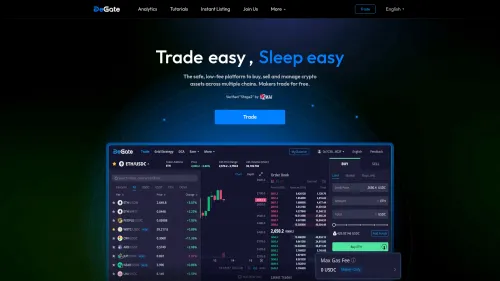DeGate (DG)
DeGate is a decentralized exchange (DEX) protocol launched in March 2021. It operates on the Ethereum blockchain using Zero Knowledge (ZK) technology as a ZK Rollup. DeGate addresses a market need by offering spot order book trading and grid trading, providing a user experience similar to that of centralized exchanges. The platform is DAO-centric, with its treasury managed entirely by the community.
Features
Spot trading

| Ticker | DG |
| Category | Decentralized Exchange (DEX) |
| Website | https://degate.com/ |
| Contract Addresses | |
|---|---|
| ethereum | 0x53...de Copied! Copied! |
DeGate enables spot trading on the Ethereum mainnet with reduced gas fees, thanks to its use of ZK Rollup technology. It supports limit orders, similar to centralized exchanges, and employs a "match node" to pair orders between traders. Transactions are periodically recorded on the mainnet, ensuring a secure and efficient trading process. DeGate offers low fees for taker orders and free trades for maker orders. Additionally, the platform includes gas-saving features that can significantly reduce user costs, such as the Gas Saving Deposit option and Ultra-Efficient Gas Saving (UEGS) technology.
Grid strategy
Grid Strategy in DeGate automates trading by placing buy and sell orders within a specified price range. This approach functions well in markets with fluctuating prices, enabling profits from small price changes. The strategy is automated, allowing traders to set upper and lower price limits, with the system executing trades based on market movements. Grid Strategy is appreciated for its adaptability, allowing traders to adjust grid density for short-term or long-term profitability without needing to predict price directions.
Common grid strategies
- Normal grid strategy: This strategy is suited for volatile markets, allowing traders to set buy and sell orders within a defined price range for passive profits.
- Buy grid strategy: Ideal for downtrending markets, this strategy lets traders place buy orders below the market price, capitalizing on potential long-term value.
- Sell grid strategy: Used in uptrending markets, this strategy involves placing sell orders above the market price to profit from rising asset values.
Liquidity mining
DeGate's liquidity mining initiative rewards users who provide liquidity within the order book, especially through grid strategy orders. These activities are organized around specific trading pairs, managed by node operators who oversee mining pools. Rewards are distributed based on the duration of participation, encouraging sustained involvement.
Batch spot trade
Batch Spot Trade enhances the efficiency of traditional order book exchanges by bundling transactions before submitting them on-chain. This method uses Zero-Knowledge Proof (ZKP) on ZK rollups to manage high-frequency order books and reduce costs. The system bundles and compresses transactions, ensuring efficient handling and accuracy through a token balance counter.
Exodus mode
Exodus Mode is a feature that ensures the security of user funds if the DeGate off-chain node ceases operations. When activated, the system halts new zkBlock data submissions, allowing users to withdraw their assets. This mode represents a permanent state change, freezing the protocol at the last valid block.
DG Token
DG is the native token of DeGate, with a total supply of 1 billion. The distribution is as follows:
- Incentives: 44%
- Financing: 20%
- Founder Financing: 19.8%
- Business Development: 9%
- Reserves: 5.2%
- Liquidity Pool: 2%
DeGate DAO
DeGate operates as a DAO, giving DG token holders governance rights and control over the treasury. While Home DAO manages the protocol, certain core principles remain unchanged as part of a social contract. Home DAO is responsible for any losses due to negligence and aims to prevent token majority dominance. Through governance, decisions on revenue usage, such as converting or burning DG, are made. DG token holders can propose governance initiatives, fostering trust and consistency.
